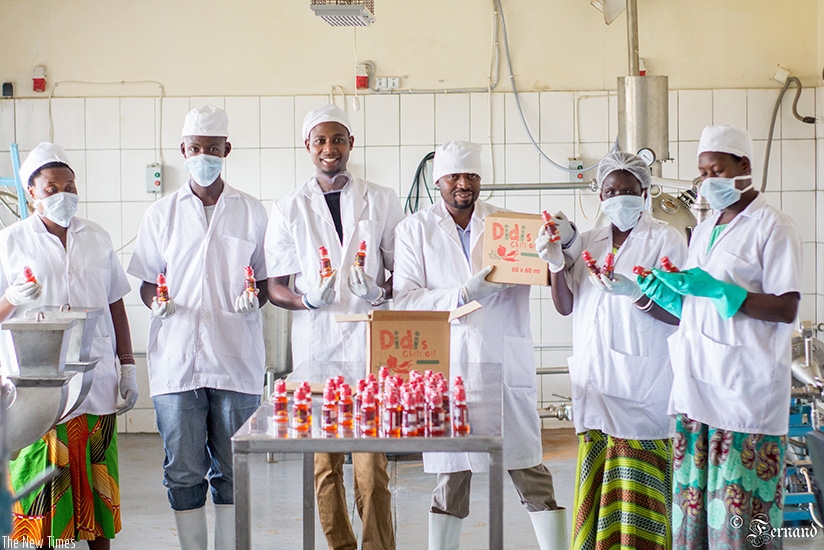In 2014, Dieudonné Twahirwa left his white collar job to venture into farming. Today he is the proud founder and managing director of Gashora Farms, the country’s leading chili export firm.


In 2014, Dieudonné Twahirwa left his white collar job to venture into farming. Today he is the proud founder and managing director of Gashora Farms, the country’s leading chili export firm.
Twahirwa graduated as an agronomist in 2012 from University of Rwanda’s College of Agriculture, Animal Sciences and Veterinary Medicine. It didn’t take long for the young man to get a job as he was employed by Horizon Sopyrwa, Rwanda’s leading producer of refined pyrethrum.
However, after a few months on the job, the resident of Gashora sector in Bugesera District called it quits, and embarked on chili farming. For him, the decision to quit his white collar job could have been the most difficult, but does not regret the move having been a business oriented person right from University.
"I was hoping to be a medical doctor but somehow I found myself doing agriculture at university and at the same time ventured into showbiz trying to organize some events, concerts, and helping artistes to launch their albums,” he recalls.
He says that working with Horizon’s Sopyrwa helped him learn about agricultural practices, and found his new hobby, being on the farm.
Armed with both theoretical and practical skills and experience from Sopyrwa, he ventured into horticulture growing tomatoes on his six hectare piece of land in Gashora, and selling them locally.
He decided to start with tomatoes and watermelon because of their high demand and with a small startup capital that he had at the time, he knew it would suffice.
His biggest challenge was having many farmers growing the same perishable crop at the same time which often translated into increased supply and henceforth a reduction in prices.
The constant price fluctuations and stiff competition from fellow farmers, prompted Twahirwa to venture into a more profitable alternative.
Shifting on to agribusiness meant having a contract before putting the seeds in the soil. Looking through the contracts, the first buyer I got was a chilli exporter and that was when I began specializing in chilli,” he explains.
Twahirwa made an initial investment of Rwf5million earned from tomato sale proceeds into spice farming by growing hybrid chilli aimed at the export market.
He reveals that the trick was to first secure the market before growing the crop on a large scale.
He began growing chill on 4 hectares of land in Gashora, expanded it to six and eventually began using out growers model, working with 1500 farmers on 200 hectares of land in total.
He also employs 21 permanent staff at the factory and about 100 casual laborers on the farm.
Gashora Farms, located in Bugesera district now exports fresh and dry in different markets of Europe like Belgium, Netherland and France and chili oil (Didi’s chilli) in Geneva and the UK and US being the main buyers with 150 boxes (9,000 bottles) and 120 boxes(6,000 bottles) respectively.
He explains that after transiting from tomatoes to supplying fresh chili, Twahiirwa encountered challenges in the post-harvest period, in terms of transport costs, and durability and thus resorted to drying it. Dry chili, he says, can last up to six months.
He later on thought of improving his products and reducing costs and came up with an idea of chilli oil which he branded Didi’s chilli.
"I dreamed of having my brand, one day I was supposed to export my chilli to India and because there was new variety in Rwanda, our eight farmers could not fill a container to export to India.
I had started doing a different type of chilli oil in my house and I spoke to a biotechnologist who helped me make it a food product and develop it. After people’s positive feedback I began making it professional by building the capacity through marketing and getting other new orders,” he says.
He is currently looking for means to tap into the local market and reveals that the local producers of ‘Akabanga’ a local chilli oil product, also contributed to paving a way for him in the chilli business.
"Akabanga helped me promote chilli oil because when I started foreign countries were not familiar with chilli oil. They were more familiar with chilli soy, powder, and chilli flex.
I however, try to improve my product by using olive oil which doesn’t have cholesterol. I see what people are complaining about and try to improve and mix different spices in the product. I also have a variety of spices that I get from India which I use that makes it different,” he says.
Twahiirwa’s long term plan is to be the leading producer and distributor of spices in Rwanda.
"After attending spice conferences I see potential in spices. I will first perfect chilli and then get onto other products,” he says.
Youth in agriculture
The 30 year old is the vice chairman of Rwanda Youth Agro business Forum, which brings together all youth in agribusiness from the ages 18 to 35, which boasts of 2200 members categorized into five clusters namely, crop production, agro processing, input and services, ICT for agriculture and livestock.
He uses his success story to inspire others in the forum and reveals that the same forum is managing internship in agriculturists for graduates who have experience and helps provide opportunities for them.
Some youth do not like agriculture because they don’t see the opportunities in it but once they are exposed to agricultural practices, they are able to enjoy the benefits and get jobs, he says.
editorial@newtimes.co.rw


